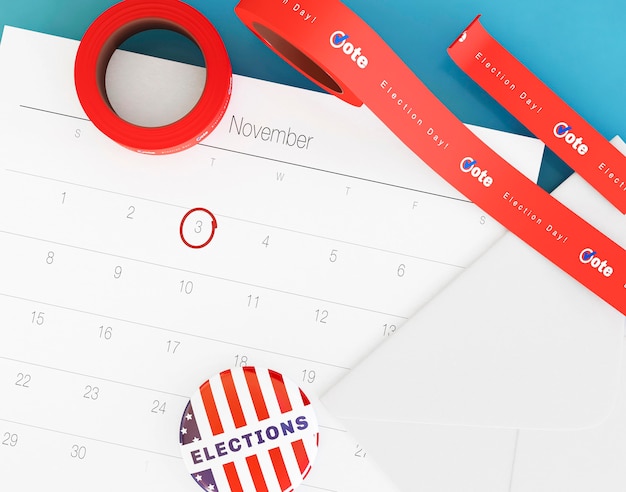Key Dates and Deadlines for the 2026 Midterm Elections

Understanding the key dates and deadlines for the 2026 midterm elections is crucial for voters, candidates, and political organizations to effectively participate in the democratic process and ensure timely engagement.
Navigating the election landscape requires awareness of crucial timelines. Knowing what are the key dates and deadlines for the 2026 midterm elections empowers citizens, candidates, and organizations to engage effectively.
Understanding the 2026 Midterm Elections Timeline
The midterm elections, held every two years, are crucial for shaping the political landscape in the United States. Staying informed about the timeline ensures active participation and maximizes your impact on the democratic process.
This guide breaks down the key phases and gives insights into the election cycle.
Why are Midterm Elections Important?
Midterm elections determine which party controls Congress and significantly impact the President’s ability to pass legislation.
- Shape Policy: The outcome influences laws on healthcare, education, and the economy.
- Check on Power: They provide an opportunity for voters to assess the performance of the President and his party.
- Local Impact: Elections also determine state and local leadership, directly impacting community decisions.
Being aware of these factors highlights the importance of midterm elections.

Key Voter Registration Deadlines
Registering to vote is the first and most important step. Each state has specific deadlines, and missing yours could prevent you from participating.
Here’s what you need to know.
Finding Your State’s Deadline
Deadlines vary widely. Some states allow same-day registration, while others require registration weeks in advance.
- State Election Websites: Check your state’s official election website for accurate dates.
- National Resources: Organizations like the U.S. Vote Foundation provide helpful tools.
- Local Election Offices: Contact your local election office for assistance.
It is very important to not miss these voter registration deadline.
Primary Election Dates and What They Mean
Primary elections are where each party chooses its candidates for the general election. Participating in primaries allows you to influence who represents your party.
Here’s how primaries fit into the overall timeline.
Open vs. Closed Primaries
Understand the rules of your state’s primary system. Open primaries let any registered voter participate, while closed primaries restrict voting to registered party members.
Open Primary: Voters can choose which party’s primary to vote in, regardless of their registration.
Closed Primary: Only voters registered with a particular party can vote in that party’s primary.
Knowing how your state runs its primaries is key to participating effectively.
Absentee Voting and Early Voting Periods
Absentee and early voting offer convenient alternatives to voting on Election Day. These options accommodate various schedules and circumstances.
Make planning your vote easier.
Understanding Absentee Ballots
Absentee ballots allow you to vote by mail. Request one if you’ll be out of town, have health concerns, or any other valid reason.
- Requesting a Ballot: Apply through your state’s election website or local election office.
- Returning the Ballot: Follow instructions carefully and mail it back before the deadline.
- Tracking Your Ballot: Many states offer online tracking to confirm receipt.
Make sure you are informed on these guidelines for a smooth process.
Election Day: November 3, 2026
Election Day is the culmination of the entire election cycle. Plan ahead to ensure you can cast your vote and make your voice heard.
This is the most important day of the cycle. It will decide many things.
Finding Your Polling Place
Confirm your polling location closer to Election Day, as it may have changed since the last election.
Polling Place Locator: Most states have online tools to find your assigned polling place.
Local Election Office: Contact your local office if you have trouble finding your location.
What to Bring with You
Check your state’s requirements for acceptable forms of identification. Some states require photo IDs while others accept non-photo options.

Post-Election Audits and Certification
The election process doesn’t end on Election Day. Post-election audits and certification ensure the accuracy and integrity of the results.
This confirms that every vote is being counted.
The Role of Audits
Audits involve examining a sample of ballots to verify that the machine counts match the paper record, enhancing voter confidence in the outcome.
Risk-Limiting: These audits aim to confirm the outcome with a predetermined statistical level of confidence.
Statistical: These ensure that the machines are counting correctly in every election.
Knowing this ensures that all votes are honest and safe.
Staying Informed Throughout the Election Cycle
The election cycle is dynamic, with numerous events and developments. Stay informed by following trusted news sources, participating in candidate forums, and engaging with voter education initiatives.
Being informed helps you make an educated decision.
- Reputable News Sources: Stay informed with reporting from respected news organizations.
- Candidate Forums: Attend events to hear directly from candidates.
- Voter Education: Participate in programs to understand issues and candidates.
| Key Point | Brief Description |
|---|---|
| 🗓️ Voter Registration | Ensure you are registered before your state’s deadline to participate in elections. |
| 🗳️ Primary Elections | Participate in primaries to choose your party’s candidates for the general election. |
| ✉️ Absentee Voting | Request and return your absentee ballot by the deadline if you cannot vote in person. |
| 📅 Election Day | Plan to vote on Election Day, confirm your polling place, and bring required identification. |
Frequently Asked Questions
▼
The 2026 midterm elections will be held on November 3, 2026. This is a nationwide election day, and you must adhere to your state’s guidelines to have your vote counted.
▼
You can register to vote online through your state’s election website or by submitting a paper registration form to your local election office. Requirements include proof of residency and identification.
▼
Primary elections are held to select candidates within each political party who will then compete in the general election. They allow registered voters to express their preferences among potential nominees.
▼
Yes, many states offer early voting and absentee voting options. Check your state’s regulations for specific deadlines and requirements to ensure your vote is correctly processed and counted.
▼
Stay updated through reputable news sources, official government websites, or non-partisan election resources. Follow candidate debates, forums, and discussions to make an educated decision.
Conclusion
Staying informed about what are the key dates and deadlines for the 2026 midterm elections ensures that every citizen can participate effectively in shaping the future of the country. By being proactive and aware, voters can make sure their voices are heard and their votes are counted.
